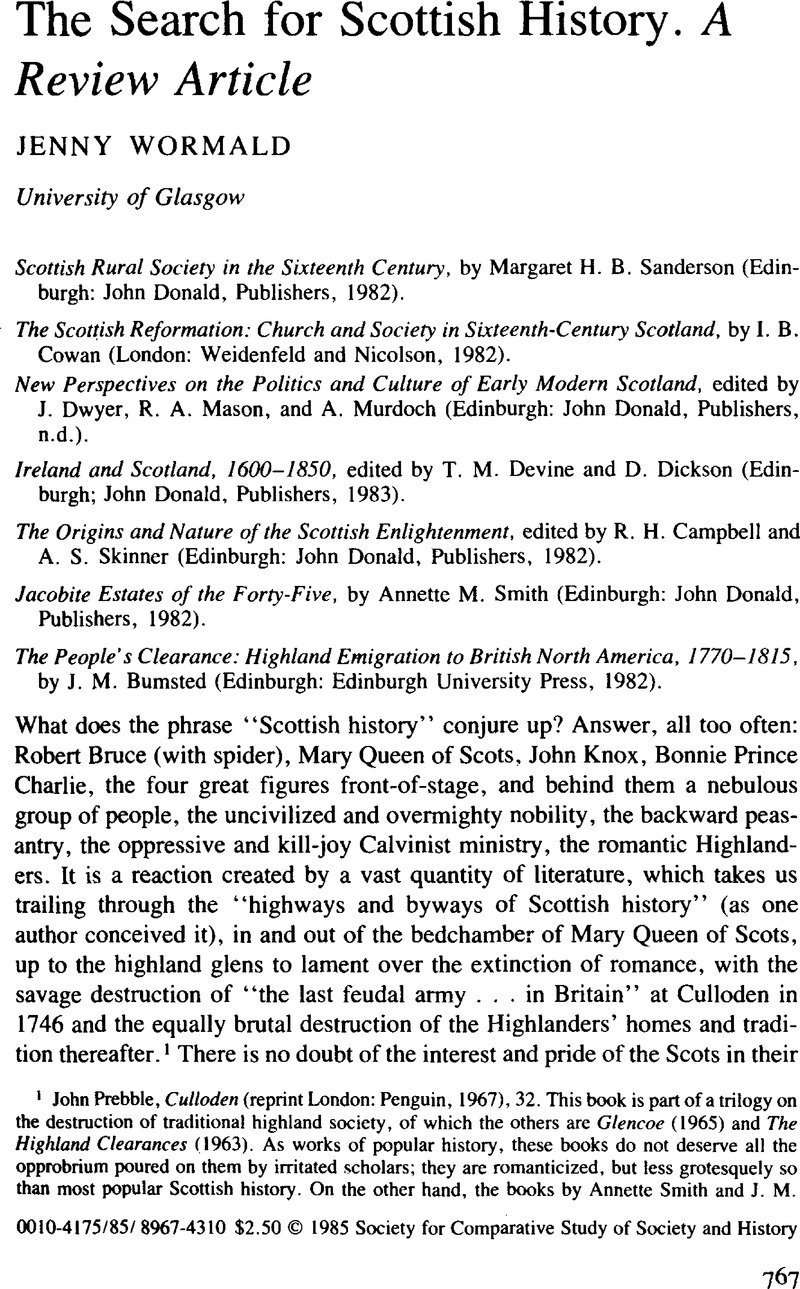No CrossRef data available.
Article contents
The Search for Scottish History. A Review Article
Published online by Cambridge University Press: 03 June 2009
Abstract

- Type
- CSSH Discussion
- Information
- Copyright
- Copyright © Society for the Comparative Study of Society and History 1985
References
3 Prebble, John, Culloden (reprint London: Penguin, 1967), 32Google Scholar. This book is part of a trilogy on the destruction of traditional highland society, of which the others are Glencoe (1965) and The Highland Clearances (1963). As works of popular history, these books do not deserve all the opprobrium poured on them by irritated scholars; they are romanticized, but less grotesquely so than most popular Scottish history. On the other hand, the books by Annette Smith and J. M. Bumstead, listed here, show up the problems created by the romantic approach; these authors, whose works may be set alongside Speck, W. A., The Butcher (1981)Google Scholar–an unromantic appraisal of Cumberland—Lenman, Bruce, The Jacobite Risings in Britain, 1689–1746 (1980)Google Scholar, and Richards, Eric, The Leviathan of Wealth (1973), may be less easy to read, but are infinitely more revealing about their subjects.Google Scholar
2 Mitchison, R., review of The Strange Death of Scottish History by Marinell Ash, in Scottish Historical Review, 61 (1982), 194Google Scholar. The problem of the Scottish view of the past is brilliantly analysed by Pocock, J. G. A., “British History: A Plea for a New Subject,” Journal of Modern History, 47 (1975).Google Scholar
3 See the discussion in Smith, Jacobite Estates, ch. 10; also Brown, P. H., Early Travellers in Scotland (1891), an anthology of disgruntled travellers' tales.Google Scholar
4 This is particularly well demonstrated by Leaman, Bruce, Integration, Enlightenment, and Industrialization (1981).Google Scholar
5 Most recently exemplified by Grant, I. F., The Social and Economic Developments of Scotland before 1603 (1930); the title is somewhat misleading.Google Scholar
6 Devine, and Dickson, Google Scholar, Ireland and Scotland, 22.Google Scholar
7 Dodgshon, R. A., Land and Society in Early Scotland (1981)Google Scholar; Whyte, Ian, Agriculture and Socie? in Seventeenth-Century Scotland (1979).Google Scholar
8 This is now perhaps even more true of attitudes in North America, themselves of historical interest because of the legacy of the immigrants of the eighteenth and nineteenth centuries. Thus my own attempt to argue in Court, Kirk, and Community (1981) that the Reformation was much more than merely a reaction to Catholic corruption was castigated from across the Atlantic as showing lack of understanding of Presbyterianism and “Roman Catholic bias.” It will be interesting to see how Cowan's book fares, in view of its comparative lack of concern with John Knox.Google Scholar
9 For a not wholly successful attempt to fit sixteenth- and seventeenth-century Scotland into the Weberian model, see Marshall, G., Presbyteries and Profits: Calvinism and the Development of Capitalism in Scotland, 1560–1707 (1980)Google Scholar. Smout, T. C., A History of the Scottish People, 1560–1830 (reprint London: Fontana, 1972), 88–93, is an admirable discussion of the relationship between Calvinism and economic growth.Google Scholar
10 Wrightson, K. and Levine, D., Poverty and Piety in an English Village: Terling 1525–1700 (1979)Google Scholar; Spufford, Margaret, Contrasting Communities: English Villagers in the Sixteenth and Seventeenth Centuries (1974)Google Scholar. These are only two of an increasing number of English regional studies, most of which are concerned with political and social matters. Haigh, C., Reformation and Resistance in Tudor Lancashire (1975)Google Scholar; Bowker, Margaret, The Henrician Reformation: The Diocese of Lincoln under John Longford, 1521–1547 (1981)Google Scholar. For Scotland, M.Lynch's Edinburgh and the Reformation (1981)Google Scholar exemplifies that what could and should be done for an individual burgh should also be done for individual regions. More generally, Macfarlane's, AlanThe Origins of English Individualism (1978)Google Scholar and Wrightson's, K.English Society, 1580–1680 (1982) are, for Scottish historians, the kind of books which should one day be emulated.Google Scholar
11 Kenidge, E., The Agricultural Revolution (1967).Google Scholar


